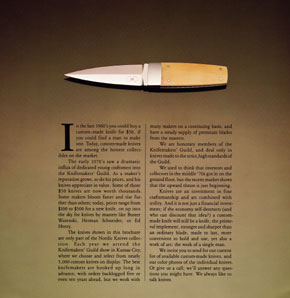Collecting Knives
In the late 1960's you could buy a custom made knife for $50, if you could find a man to make one. Today, custom-made knives are among the hottest collectibles on the market.
The early 1970's saw a dramatic influx of dedicated young craftsmen into the Knifemakers' Guild. As a maker's reputation grows, so do his prices, and his knives appreciate in value. Some of those $50 knives are now worth thousands. Some makers bloom faster and rise further than others; today, prices range from $100 to $500 for a new knife, on up into the sky for knives by masters like Buster Warenski, Herman Schneider, or Ed Henry.
The knives shown in this brochure are only part of the Nordic Knives collection. Each year we attend the Knifemakers' Guild show in Kansas City, where we choose and select from nearly 5,000 custom knives on display. The best knifemakers are booked up long in advance, with orders backlogged five or even ten years ahead, but we work with many makers on a continuing basis, and have a steady supply of premium blades from the masters.
We are honorary members of the Knifemakers' Guild, and deal only in knives made to the strict, high standards of the Guild.
We used to think that investors and collectors in the middle '70s got in on the ground floor, but the recent market shows that the upward thrust is just beginning.
Knives are an investment in fine craftsmanship and art combined with utility. And it is not just a financial investment; if the economy self-destructs (and who can discount that idea?) a custom-made knife will still be a knife, the primeval implement, stronger and sharper than an ordinary blade, made to last, more convenient to hold and use, yet also a work of art: the work of a single man.
We invite you to send for our current list of available custom-made knives, and our color photos of the individual knives. Or give us a call; we'll answer any questions you might have. We always like to talk knives.
|
 |
A skean dhu
(stocking dagger) by Steve
Hoel. The handle is
elephant ivory from the
outer shell of the tusk; the
full tang is file worked
The skean dhu became
popular among High-
lander Scots after they
were forbidden to carry
long blades after the battle
of Culloden in 1746.
|
|
|